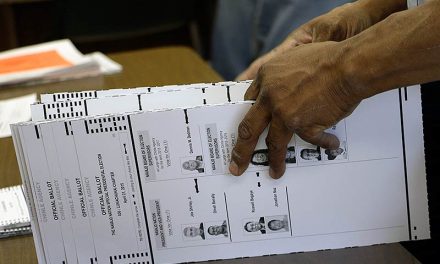
Supreme court takes up background check issue
WINDOW ROCK
A day after the Navajo Nation Board of Election Supervisors, Division of Diné Education and Diné bi Olta School Board Association agreed to press for legislation requiring criminal background checks on all candidates for Navajo Nation office, the Navajo Nation Supreme Court found itself facing the same issue.
The case, in fact, involved a school board member who had been at the previous day’s meeting.
Terlyn Sherlock, president of the board of Chilchinbeto Community School, had been ordered to vacate her post by the Navajo Election Administration last June, after DODE turned up two 2001 misdemeanor convictions she had failed to disclose on her candidate application: giving alcohol to a minor and shoplifting, both on the same day in Flagstaff.
However, Sherlock had then successfully petitioned the state to set aside the convictions, meaning they are voided unless she commits another offense.
Sherlock, 44, then appealed the case to the Office of Hearings and Appeals, which ruled on Nov. 3 that since the convictions had been voided, they should not be held against her. Sherlock was allowed to remain in her post.
The NEA appealed the case to the supreme court, arguing that the fact that the convictions were set aside after Sherlock took office did not change the fact that, in violation of Navajo election law, she had failed to disclose them on her April 2016 candidacy application.
After hearing arguments from both sides, the justices took the matter under advisement.
All three justices seemed surprised to learn that the NEA does not conduct any type of background check on candidates.
When it comes to vetting the applications, “Does the election administration have any specific duties?” Justice Eleanor Shirley wanted to know.
“They make sure all the paperwork is in order, and the candidate is who he says he is, and the filing fees are paid,” explained Chief Legislative Counsel Levon Henry, representing the NEA. “It’s more a ministerial function.”
“So there’s no procedural process with respect to how a review takes place?” pressed Shirley.
“It really is on them (the candidate) to say, ‘I meet all these qualifications,'” responded Henry. However, if the NEA learns of an irregularity, “they have the authority to say, ‘There’s an issue here and we’re going to remove them,'” Henry clarified. “It’s happened before.”
Sherlock’s attorney, Bernadine Martin, argued that her client may not have been aware that Navajo Nation election law had changed in recent years. Prior to 2014, she said, candidates could run as long as their convictions were more than five years in the past. “Miss Sherlock’s convictions were two decades ago,” she said, noting that the elections office never changed the candidate forms to reflect the limitation change and did nothing to educate candidates about it.
To read the full article, pick up your copy of the Navajo Times at your nearest newsstand Thursday mornings!
Are you a digital subscriber? Read the most recent three weeks of stories by logging in to your online account.








 Highway 264,
Highway 264, I-40, WB @ Winslow
I-40, WB @ Winslow